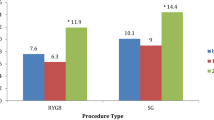Abstract
Purpose
Evidence suggests that a significant minority of individuals who undergo Roux-en-Y gastric bypass (RYGB) experience problematic alcohol and substance use following surgery. However, little research has examined characteristics, drinking patterns, and possible risk factors within this population. To provide descriptive information of a sample of adults with self-identified alcohol use problems following bariatric surgery, this study examined (1) alcohol and substance use symptoms using standardized assessments, (2) current and past psychiatric comorbidity, (3) subjective changes in alcohol sensitivity following surgery, and (4) specific patterns of alcohol use prior to and following bariatric surgery.
Materials and Methods
Adult participants (N = 26) completed a series of structured diagnostic interviews and self-report assessments (e.g., Alcohol Use Disorders Identification Test [AUDIT], Michigan Alcohol Screening Test [MAST], Drug Abuse Screening Test [DAST]) by telephone 1 to 4 years following a RYGB or sleeve gastrectomy.
Results
All participants met objective criteria for current problematic alcohol use based on AUDIT and MAST cutoff scores, reported increased subjective sensitivity to alcohol following surgery, and evidenced significant current and past psychiatric comorbidities, most notably previous major depression (45.5%). Approximately one third of participants evidenced new-onset Diagnostic and Statistical Manual of Mental Disorders (DSM-IV) alcohol use or dependence following surgery. Preoperative drinking frequencies and quantities were similar to those reported during the period of the heaviest postoperative alcohol use.
Conclusions
Findings have implications for pre- and postoperative prevention and intervention efforts. Additional research is needed to further elucidate risk factors for problematic alcohol use following bariatric surgery.
Similar content being viewed by others
References
Buchwald H, Avidor Y, Braunwald E, et al. Bariatric surgery: a systematic review and meta-analysis. JAMA. 2004;292(14):1724–37.
Steffen KJ, Engel SG, Wonderlich JA, et al. Alcohol and other addictive disorders following bariatric surgery: prevalence, risk factors and possible etiologies. Eur Eat Disord Rev. 2015;23(6):442–50.
King WC, Chen JY, Courcoulas AP, Dakin GF, Engel SG, Flum DR, Hinojosa MW, Kalarchian MA, Mattar SG, Mitchell JE, Pomp A. Alcohol and other substance use after bariatric surgery: prospective evidence from a US multicenter cohort study. Surg Obes Relat Dis. 2017;(Epub ahead of print):1392–1402.
Mitchell JE, Steffen K, Engel S, et al. Addictive disorders after Roux-en-Y gastric bypass. Surg Obes Relat Dis. 2015;11(4):897–905.
Wee CC, Mukamal KJ, Huskey KW, et al. High-risk alcohol use after weight loss surgery. Surg Obes Relat Dis. 2014;10(3):508–13.
Svensson PA, Anveden Å, Romeo S, et al. Alcohol consumption and alcohol problems after bariatric surgery in the Swedish obese subjects study. Obesity. 2013;21(12):2444–51.
Li L, Wu L. Substance use after bariatric surgery: a review. J Psychiatr Res. 2016;76:16–29.
Parrott J, Frank L, Rabena R, et al. American Society for Metabolic and Bariatric Surgery Integrated Health Nutritional Guidelines for the Surgical Weight Loss Patient 2016 Update: Micronutrients. Surg Obes Relat Dis. 2017;13(5):727–41.
Ertelt TW, Mitchell JE, Lancaster K, et al. Alcohol abuse and dependence before and after bariatric surgery: a review of the literature and report of a new data set. Surg Obes Relat Dis. 2008;4(5):647–50.
Blackburn AN, Hajnal A, Leggio L. The gut in the brain: the effects of bariatric surgery on alcohol consumption. Addict Biol. 2016;(Epub ahead of print):1–11.
Polston JE, Pritchett CE, Tomasko JM, et al. Roux-en-Y gastric bypass increases intravenous ethanol self-administration in dietary obese rats. PLoS One. 2013;8(12):e83741.
Ivezaj V, Saules KK, Wiedemann AA. “I didn’t see this coming”: why are postbariatric patients in substance abuse treatment? Patients’ perceptions of etiology and future recommendations. Obes Surg. 2012;22(8):1308–14.
Ivezaj V, Saules KK, Schuh LM. New-onset substance use disorder after gastric bypass surgery: rates and associated characteristics. Obes Surg. 2014;24(11):1975–80.
Sheehan D, Janavs J, Baker R, et al. MINI International Neuropsychiatric Interview (English version 5.0. 0) for DSM-IV. Tampa: University of South Florida; 2006.
First MB, Spitzer RL, Miriam G, Williams JBW. Structured Clinical Interview for DSM-IV-TR Axis I Disorders, Research Version, Non-patient Edition. SCID-I/NP) New York: Biometrics Research, New York State Psychiatric Institute; 2002.
Saunders JB, Aasland OG, Babor TF, et al. Development of the alcohol use disorders identification test (AUDIT): WHO collaborative project on early detection of persons with harmful alcohol consumption-II. Addiction. 1993;88(6):791–804.
Selzer ML. The Michigan Alcoholism Screening Test: The quest for a new diagnostic instrument. Am J Psychiatry. 1971;127(12):1653–8.
Skinner HA. The drug abuse screening test. Addict Behav. 1982;7(4):363–71.
Newlin DB, Pretorius MB. Sons of alcoholics report greater hangover symptoms than sons of nonalcoholics: a pilot study. Alcohol Clin Exp Res. 1990;14(5):713–6.
Conigrave KM, Hall WD, Saunders JB. The AUDIT questionnaire: choosing a cut-off score. Addiction. 1995;90(10):1349–56.
Dawe S, Mattick RP. Review of diagnostic screening instruments for alcohol and other drug use and other psychiatric disorders. AGPS; 1997.
Author information
Authors and Affiliations
Corresponding author
Ethics declarations
Conflicts of Interest
Authors K.E.S., S.G.E., K.J.S., L.G., K.G., A.K., and J.E.M. have no conflicts of interest to disclose. The research was supported by NIMH T32MH082761 (Author K.E.S.). K.J.S. was also supported by the following grants: NIH (1R01DK112585, 3R01DK112585-01S1, 1R01AA022336, 3R01AA022336-01A1S1), Shire Pharmaceuticals, and Sanford Profile.
Informed Consent
Informed consent was obtained from all individual participants included in the study.
Human and Animal Rights
All procedures performed were in accordance with the ethical standards of the institutional and/or national research committee and with the 1964 Helsinki Declaration and its later amendments or comparable ethical standards.
Rights and permissions
About this article
Cite this article
Smith, K.E., Engel, S.G., Steffen, K.J. et al. Problematic Alcohol Use and Associated Characteristics Following Bariatric Surgery. OBES SURG 28, 1248–1254 (2018). https://doi.org/10.1007/s11695-017-3008-8
Published:
Issue Date:
DOI: https://doi.org/10.1007/s11695-017-3008-8



